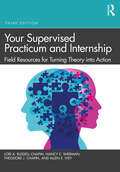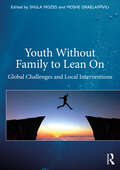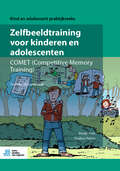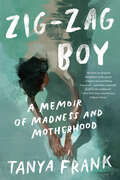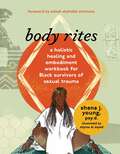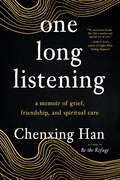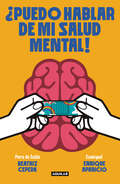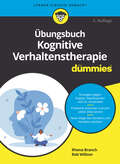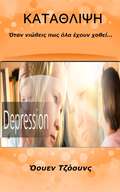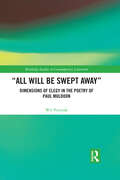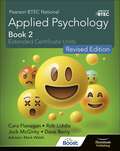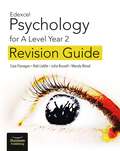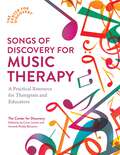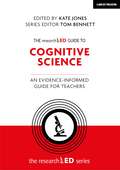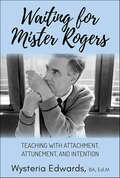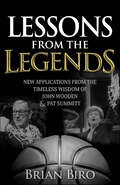- Table View
- List View
Your Supervised Practicum and Internship: Field Resources for Turning Theory into Action
by Allen E. Ivey Nancy E. Sherman Lori A. Russell-Chapin Theodore J. ChapinYour Supervised Practicum and Internship is a complete, up-to-date guide to everything a graduate student in the helping professions needs for a successful practicum, internship, or field experience. This helpful resource takes students through the necessary fundamentals of field experience, helping them understand the supervision process and their place in it. The authors fully prepare students for more advanced or challenging scenarios they are likely to face as helping professionals. The new edition also interweaves both CACREP and NASW standards, and incorporates changes brought by the DSM-5. Its unique focus is on neurocounseling and how bridging brain and behavior assists counselors in becoming more efficacious in treatment selections for talk therapy. Your Supervised Practicum and Internship takes the practical and holistic approach that students need to understand what really goes on in agencies and schools, providing evidence-based advice and solutions for the many challenges field experience presents.
Youth Without Family to Lean On: Global Challenges and Local Interventions
by Moshe Israelashvili Shula MozesYouth Without Family to Lean On draws together interdisciplinary, global perspectives to provide a comprehensive review of the characteristics, dynamics, and development of youth (aged 15–25) who have no family to lean on, either practically or psychologically.In this timely volume, Mozes and Israelashvili bring together leading international experts to present updated knowledge, information on existing interventions, and unanswered questions in relation to youth without family to lean on, in pursuit of fostering these youth’s positive development. The various chapters in this book include discussions on different topics such as social support, developing a sense of belonging, parental involvement, and internalized vs. externalized problems; on populations, including homeless youth, residential care-leavers, refugees, asylum-seekers, young women coming from vulnerable families, and school dropouts; and interventions to promote these youths' mentoring relationships, labor market attainment, out-of-home living placements, use of IT communication, and participation in community-based programs. Additionally, various problems and challenges are presented and elaborated on, such as: Who needs support? Who is qualified to provide support? How should related interventions be developed? The book takes a preventive approach and aims to emphasize steps that can be taken in order to promote young people’s positive development in spite of the absence of a family to rely on in their life and examines the best practices in this context, as well as the international lessons that deserve further dissemination and exploration. This book is essential reading for those in psychology, sociology, public health, social work, law, criminology, public policy, economics, and education and is highly enriching for scholars and practitioners, as well as higher education students, who wish to understand and help the gradually increasing number of youth who are forced, too early, to manage their life alone.
Zeitpsychologie: Der Einfluss der Zeit auf das menschliche Erleben und Handeln
by Antje FladeDie Psychologie der Zeit befasst sich mit einem Phänomen, auf das aus wahrgenommenen Veränderungen geschlossen wird. Zeit gibt es nur, wenn sich etwas verändert. Weil Veränderungen immer irgendwo stattfinden, hängen das Wann und das Wo untrennbar miteinander zusammen, was sich in den Begriffen Zeitraum und Raumzeit widerspiegelt. Ein Buch über Zeitpsychologie soll sensibilisieren, indem die Bedeutung der „vierten Dimension“ im alltäglichen Erleben und Handeln bewusst wird, die sich im Unterschied zum dreidimensionalen Raum der unmittelbaren Wahrnehmung entzieht. So werden manche Verhaltensweisen erst verstehbar, wenn man den Zeitfaktor einbezieht. Es geht um Fragen der Zeitverwendung und Zeiteinsparung, um das Zusammenpassen unterschiedlicher Zeitstrukturen in verschiedenen Lebensbereichen und um die Zeitperspektive, die sich aus dem gegenwärtigen Moment, der erinnerten Vergangenheit und der vorgestellten Zukunft zusammensetzt. Es ist die Vergangenheit, die den Menschen zu dem gemacht hat, was er gegenwärtig ist. Ohne eine Zukunftsperspektive gäbe es keine Motivation und kein Planen. Die Zeitperspektiventherapie ist darauf gerichtet, eine Balance zwischen den drei Abschnitten herzustellen sowie Depressionen und psychische Erkrankungen zu heilen, die auf einer fehlenden Zukunftsperspektive oder auf traumatischen Erfahrungen beruhen. Es gibt keine Zeitlosigkeit, denn Veränderungen finden fortwährend statt. Indem er kulturelle Umwelten und gebaute Umwelten schafft, trägt der Mensch aktiv dazu bei. Nicht nur die Umwelt ändert sich, sei es durch natürliche Vorgänge oder durch menschliches Handeln, sondern auch der Mensch selbst, indem er heranwächst und altert. Ein Ziel des Buches ist in Analogie zum Umweltbewusstsein das Zeitbewusstsein zu stärken.
Zelfbeeldtraining voor kinderen en adolescenten: COMET (Competitive Memory Training) (Kind en adolescent praktijkreeks)
by Marije Kuin Paulien PetersIn deze herziene versie van de therapeutenhandleiding wordt de interventie Zelfbeeldtraining voor kinderen en adolescenten - Competitive Memory Training (COMET) theoretisch en praktisch uitgelegd. Zelfbeeldtraining voor kinderen en adolescenten is gebaseerd op de cognitief-gedragstherapeutische methode Competitive Memory Training (COMET) van Kees Korrelboom. Deze methode is bij het NJI (Nederlands Jeugd Instituut) als theoretisch goed onderbouwd bestempeld. Deelnemers werken aan positief denken, voelen en doen door positieve gevoelens op te roepen. Via contraconditonering wordt dit positieve zelfgevoel geactiveerd op moeilijke momenten. In deze herziene versie wordt geen verschil meer gemaakt tussen een individuele variant en een groepsvariant. Er is één variant, welke zowel individueel als groepsgewijs te gebruiken is. Daarnaast kunnen behandelaar en cliënt elke sessie zelf kiezen welke oefeningen nuttig zijn om positief denken, voelen en doen te stimuleren. Na het lezen van deze handleiding kan de behandelaar aan de slag met de interventie. Deze is toepasbaar bij zelfbeeldproblematiek, welke aanwezig en/of ten grondslag kan liggen aan bijvoorbeeld stemmingsproblemen, gedragsstoornissen en angststoornissen. Hiermee kunnen psychologen, orthopedagogen of andere hulpverleners kinderen en adolescenten meer zelfvertrouwen geven. Het bijbehorende werkboek is geschreven voor kinderen en jongeren vanaf 8 jaar tot in de jong volwassenheid.
Zig-Zag Boy: A Memoir of Madness and Motherhood
by Tanya Frank“By turns an eloquent meditation on the power of nature and a terrifying exposé of…parenting a mentally ill child into adulthood.” —New York Times Book Review, Editors’ Choice A compassionate, heartrending memoir of a mother’s quest to accept her son’s journey through psychosis. One night in 2009, Tanya Frank finds her nineteen-year-old son, Zach—gentle and full of promise—in the grip of what the psychiatrists would label a psychotic break. Suddenly and inexplicably, Tanya is thrown into a parallel universe: Zach’s world, where the phones are bugged, his friends have joined the Mafia, and helicopters are spying on his family. In the years following Zach’s shifting psychiatric diagnoses, Tanya goes to war for her son, desperate to find the right answer, the right drug, the right doctor to bring him back to reality. She struggles to navigate archaic mental healthcare systems, first in California and then in her native London during lockdown. Meanwhile, the boy she raised—the chatty, precocious dog-lover, the teenager who spent summers surfing with his big brother, the UCLA student—suffers the effects of multiple hospitalizations, powerful drugs that blunt his emotions, therapies that don’t work, and torturous nights on the streets. Holding on to startling moments of hope and seeking solace in nature and community, Tanya learns how to abandon her fears for the future and accept the mysteries of her son’s altered states. With tenderness, lyricism, and generous candor, this compelling story conveys the power of a mother’s love. Zig-Zag Boy is both a moving lamentation for things lost and a brave testament to the people we become in difficult circumstances.
Zoos and Aquariums in the Public Mind (Psychology and Our Planet)
by John Fraser Joe E. Heimlich Kelly RiedingerThis book summarizes a range of psychological research into how zoos and aquariums operate in the minds of visitors and the broader public. Bringing together core findings from emerging international research, the book provides data-based summaries that situate the content in the larger context of how cultural institutions shape public understanding. The focus of this book is to bring into a single resource, the major strains of research that have explored how zoos and aquariums are situated in public consciousness, to ground the discourses around what zoos and aquariums do in the empirical data and evidence, and to find opportunities to summarize well-established fact to support future research expanding on the known. Among the topics discussed:History of zoo and aquarium developmentThe role of zoos and aquariums in environmental literacyEmpathy development at zoosApplying behavior change theories to the zoo visitor’s experienceSocial radiation of ideas from cultural institutionsProfessional practitioners, zoo industry professionals, and business leaders will find this book an invaluable guide to the psychological literature surrounding the zoo industry.
Zwischen Vernunft und Illusion: Entmystifizierung der Schizophrenie
by Jorge Cândido Assis Cecília Cruz Villares Rodrigo Affonseca BressanIn diesem Buch finden Sie realistischen Erfahrungsbeispiele von Menschen, die mit Schizophrenie leben und von deren Familienangehörigen, die damit konfrontiert sind. Und zwar von der Erkennung der ersten Symptome bis zur Behandlung von Schizophrenie, die eine Form der Psychose ist und bei der subjektive Aspekte, wie Halluzinationen und Wahnvorstellungen, das Verständnis der Realität verzerren.Auch finden Sie darin Strategien zur Bewältigung. Und da psychotische Zustände im Laufe der Zeit in ihrer Intensität schwanken, leben die Betroffenen buchstäblich zwischen Vernunft und Illusion. Zwischen Vernunft und Illusion: Entmystifizierung der Schizophrenie ist eine Einladung zu verstehen, was es bedeutet, an Schizophrenie zu erkranken und ein Leben lang damit zu leben. Und dies ist eine Einladung an alle, die in irgendeiner Weise von dieser Krankheit betroffen sind: diejenigen, die damit leben, Familienmitglieder, Freunde, Gesundheitsfachleute und alle, die einen nicht stigmatisierten Blick auf psychische Störungen und Menschen, die damit leben, haben wollen. "Angesichts einer Psychose sind Betroffene und deren Familien verloren und suchen nach alternativer oder spiritueller Hilfe, was den Beginn der Behandlung meist verzögert. Jorge, Cecília und Rodrigo hatten den Mut, sich einem schwierigen Thema zu stellen, und die wunderbare Idee, ein aufklärendes Buch über Schizophrenie zu schreiben. Das besondere Merkmal des Buches liegt darin, dass es die Erfahrungen der Erkrankten sowie der Familienangehörigen berücksichtigt und angesichts des aktuell im Leben aufgetretenen Erkrankungsereignisses geschrieben wurde". - Dr. Itiro Shirakawa, emeritierter Professor der Paulista Medical School der Bundesuniversität von São Paulo (UNIFESP/EPM), Brasilien.
body rites: a holistic healing and embodiment workbook for Black survivors of sexual trauma
by shena j youngA written companion and workbook for readers seeking to reclaim their bodies as home in healing from sexual trauma. Body rites as a holistic healing journey, anchored in the practice of decolonizing healing and reclaiming body sovereignty, reaches back into indigenous roots and land-based healing. It centers remembering as a means of survival. This workbook is the first of its kind: a resource of rituals divided into four healing journeys for Black women, femmes, and nonbinary survivors of sexual assault. The experiential workbook moves beyond prescriptive self-help models by providing a gentle guide and liaison to explore the impact of sexual trauma on the mind, body, heart, and spirit. It is an invitation to heal holistically, drawing upon psychophysiology, lived body wisdom, trauma-informed embodiment practices, kinship and ancestral connections, and African spiritual practices. Most urgently, this book is a series of intimate conversations with your “self”; and remembrance that healing lives at the core of your intuition.
one long listening: a memoir of grief, friendship, and spiritual care
by Chenxing HanFor readers of The Wild Edge of Sorrow and Crying in H-Mart--a profound and searching memoir of life, loss, grief, and renewal from one of American Buddhism&’s most vital new voices. How do we grieve our losses? How can we care for our spirits? one long listening offers enduring companionship to all who ask these searing, timeless questions.Immigrant daughter, novice chaplain, bereaved friend: author Chenxing Han (Be the Refuge) takes us on a pilgrimage through the wilds of grief and laughter, pain and impermanence, reconnecting us to both the heartache and inexplicable brightness of being human.Eddying around three autumns of Han&’s life, one long listening journeys from a mountaintop monastery in Taiwan to West Coast oncology wards, from oceanside Ireland to riverfront Phnom Penh. Through letters to a dying friend, bedside chaplaincy visits, and memories of a migratory childhood, Han's startling, searching memoir cuts a singular portrait of a spiritual caregiver in training.Just as we touch the depths, bracing for resolution, Han&’s swift, multilingual prose sweeps us back to unknowingness: 不知最親切. Not knowing is most intimate. Chinese mothers, hillside graves. A dreamed olive tree, a lost Siberian crane. The music of scripts and silence. These shards--bright, broken, giddy, aching--are mirrors to our own lives in joy and sorrow.A testament to enduring connection by a fresh and urgent new literary voice, one long listening asks fearlessly into the stories we inhabit, the hopes we relinquish, and what it means simply to be, to and for the ones we love.
smartWorkLife - Bewusst erholen statt grenzenlos gestresst: Flexibel und gesund arbeiten in New Ways of Working
by Martina Hartner-Tiefenthaler Simone Polic-Tögel Maria Magdalena MayerKönnen wir autonom und flexibel arbeiten, ohne auszubrennen? Dürfen berufliche und private Grenzen im Homeoffice verschwimmen? Welche persönlichen und organisationalen Ressourcen unterstützen uns beim Umgang mit den Herausforderungen im Homeoffice? Welche Rolle spielt dabei die Führungskraft?Das sind nur einige Fragen, wenn es um New Ways of Working und dem Arbeiten im Homeoffice geht. Die Autorinnen liefern durch ihre wissenschaftliche Expertise spannende Antworten auf diese brennenden Fragen unserer Zeit. Sie verbinden in diesem Buch auf sehr anschauliche Weise die Themenfelder Arbeitsautonomie, Digitalisierung, Vermischung von Arbeit und Privatleben, Ressourcenerhaltung sowie organisationale Rahmenbedingungen von flexibler Arbeit – praxisnah und evidenzbasiert.Ein hochaktueller Leitfaden für die Arbeitswelt von morgen – empfehlenswert für Studierende und Lehrende, Angestellte und Führungskräfte, Personal- und Gesundheitsmanager*innen sowie Betriebsräte und Berater*innen.
¿Puedo hablar de mi salud mental!
by Perra de Satán EsnorquelDos personas cucú te explican que ir al psicólogo no es ninguna locura. Desde su exitoso pódcast, ¿Puedo hablar!, Enrique Aparicio (Esnórquel) y Beatriz Cepeda (Perra de Satán) rompen tabúes y tratan con naturalidad cuestiones como la ansiedad, la depresión, los trastornos de la conducta alimentaria o la ideación suicida. El libro ¿Puedo hablar de mi salud mental! es el puente que quieren tender a todas las personas que intuyen que hay algo en su vida que falla, pero no se atreven a pedir ayuda. Su ejemplo, el de dos personas para las que la terapia ha sido fundamental, puede servir de impulso para quienes saben que deben arreglar algo en su cabeza, aunque no sepan bien lo que es. «Durante mucho tiempo creí que el sufrimiento era intrínseco a la vida, una consecuencia natural de hacerse mayor. En terapia empecé a deshacer el precario castillo de naipes sobre el que había construido mi visión del mundo: descubrí que ser gay y gordo no solo eran dos simpáticas circunstancias, sino partes de mi identidad que me habían expuesto a una serie de violencias que me condicionaban. La ayuda profesional me dado herramientas fundamentales. Por eso quiero que, si crees que la necesitas, acudas a ella cuanto antes». Enrique Aparicio, Esnórquel «Cuando empecé a engordar mi vida cambió por completo. Pasé de ser una niña sin problemas a una con un problema muy gordo. Nuestra sociedad hace creer a las niñas que engordar es algo muy grave contra lo que deben luchar. Cuando iba al médico y me quejaba de los nervios, ya que no sabía lo que era la ansiedad, le explicaba que sufría ataques, dolores de cabeza muy frecuentes y otros síntomas. La única respuesta que recibía era: Tienes que adelgazar, haz deporte y come menos. Acabé desarrollando un trastorno de la conducta alimentaria. Si he contado mi historia y he escrito este libro es para ponérselo más fácil a otras personas». Beatriz Cepeda, Perra de Satán
Übertriebene Verantwortlichkeit und psychische Störungen: Behandlungsleitfaden für Psychotherapie und Beratung (Psychotherapie: Praxis)
by Nils SpitzerDas Buch informiert darüber, wie eine individuell stark ausgeprägte Verantwortlichkeit psychisch belasten kann und mit welchen Interventionen Psychotherapeut:innen und Berater:innen das hypervalente Verantwortungsgefühl wieder ausgeglichener gestalten können. Es versucht die Rolle übertriebener Verantwortlichkeit bei psychischen Störungen deutlich zu machen, stellt wichtige therapeutische Ansatzpunkte vor und bietet konkrete Interventionen dafür. Das Thema Verantwortung hat seit einigen Jahren Konjunktur. Alle Bürger sollen immer mehr Verantwortung übernehmen – für das Klima, die eigene Altersabsicherung und vieles mehr. Die dunkle Kehrseite der Verantwortung wird dabei häufig außer Acht gelassen: Eine übertriebene Verantwortlichkeit kann auch krank machen. Zwangsstörung, soziale Phobie, Depression, generalisierte Angststörung, Hypochondrie, Psychose: Übertriebene Verantwortung ist dabei, als wichtiger transdiagnostischer Faktor wahrgenommen zu werden. Aus dem Inhalt: Mögliche Ursachen übertriebener Verantwortlichkeit – Gesellschaftlicher Hintergrund – Psychische Folgen – Therapieziele – Exploration – Interventionen. Über den Autor: Nils Spitzer ist Psychologischer Psychotherapeut (kognitive Verhaltenstherapie) in freier Praxis, Dozent psychotherapeutischer Ausbildungsinstitute, Autor von Büchern, zahlreichen Artikeln und Mitherausgeber der Zeitschrift für Rational-Emotive & Kognitive Verhaltenstherapie (2010-2020). Neben Psychologie hat er Soziologie und Literaturwissenschaft studiert.
Übungsbuch Kognitive Verhaltenstherapie für Dummies (Für Dummies)
by Rob Willson Rhena BranchPlagen Sie manchmal Ängste oder schlaflose Nächte, in denen Ihnen alle möglichen Gedanken durch den Kopf gehen? Leiden Sie unter Ängsten, Depressionen oder Zwängen? Dieses Übungsbuch vermittelt Ihnen die Techniken der Kognitiven Verhaltenstherapie und hilft Ihnen auch ohne begleitende Therapie, Ihren Gedanken, Bewertungen und Überzeugungen auf die Spur zu kommen. Das Buch ist gespickt mit Fallbeispielen, Checklisten und Arbeitsblättern. Es begleitet Sie dabei, sich von weniger hilfreichen Überzeugungen zu lösen und so eingefahrene Verhaltensmuster zu verändern. Und auf einmal erscheinen Ihnen Ihre Einstellungen in einem ganz neuen Licht.
Κατάθλιψη: Όταν νιώθεις πως όλα έχουν χαθεί… (Πώς να… #77)
by Όουεν ΤζόουνςΓεια σου. Σ’ ευχαριστώ που αγόρασες το ηλεκτρονικό βιβλίο Κατάθλιψη (Τίτλος πρωτοτύπου: Depression). Ελπίζω να βρεις τις πληροφορίες αυτές χρήσιμες και ωφέλιμες. Θα ήθελα να γνωρίζεις ότι έγραψα το περιεχόμενο αυτού του βιβλίου κατόπιν σημαντικής έρευνας. Το βιβλίο μπορείς να το αγοράσεις μόνο από εμένα. Οι πληροφορίες σε αυτό το βιβλίο πάνω στις διάφορες πτυχές της κατάθλιψης και σχετικών αντικειμένων είναι διαχωρισμένες σε 15 κεφάλαια των περίπου 500-600 λέξεων το καθένα. Αν έχεις τυχόν σχόλια ή προτάσεις βελτίωσης, δώσ’ τα στην εταιρεία από την οποία αγόρασες αυτό το βιβλίο. Από εκεί, μπορείς, επίσης, να βρεις κι άλλα βιβλία σαν αυτό. Σ’ ευχαριστώ και πάλι για την αγορά αυτού του βιβλίου. Με εκτίμηση, Όουεν Τζόουνς
Μην ξεχνάς τον Στίβεν: A Quick-read Police Procedural Set In Picturesque Canada (Zachary Goldman Mysteries Ser. #Vol. 8)
by P. D. WorkmanΠοτέ δεν αποκάλυπτε τι συνέβαινε πίσω από τις κλειστές πόρτες. Αλλά αυτή τη φορά, του είναι αδύνατον να θυμηθεί. Τα πράγματα δεν ήταν ποτέ εύκολα για τον Στίβεν. Αυτό το αποδέχεται και κάνει ό,τι καλύτερο μπορεί. Μπορεί να μην έχει γονείς ή ένα ευτυχισμένο σπίτι ή αρκετά για να φάει τις περισσότερες μέρες. Αλλά τουλάχιστον έχει μερικούς πιστούς φίλους που του συμπαραστέκονται και τον βοηθούν όταν μπορούν. Και τουλάχιστον έχει σχολείο, ένα μέρος όπου μπορεί να πηγαίνει για να ξεφεύγει από την κακοποίηση. Αλλά εκεί που νόμιζε ότι τα πράγματα δεν μπορούσαν να γίνουν χειρότερα, έγιναν. Ο Στίβεν κατηγορείται για φόνο. Αλλά αυτό δεν είναι το χειρότερο. Το πραγματικά κακό είναι ότι δεν ξέρει καν αν τον έκανε αυτό το φόνο.
“All Will Be Swept Away”: Dimensions of Elegy in the Poetry of Paul Muldoon (Routledge Studies in Contemporary Literature)
by Wit PietrzakThe book offers the first comprehensive study of Paul Muldoon’s mourning verse. Considering not only the celebrated elegies like "Yarrow," "Incantata" or "Sillyhow Stride" but also the elegiac impulse as it develops throughout Muldoon’s entire work, All Will Be Swept Away charts a large swathe of Muldoon’s poetic landscape in order to show the complexity with which he approaches the themes of death and mourning. Using archival material as well as a vast array of theoretical apparatuses, the book unveils the psychological, literary and political undertones in his poetry, all the while attending to the operations of the poetic text: its form, its music and its capacity to console, warn and censure.
Pearson BTEC National Applied Psychology: Book 2
by Cara Flanagan Mark Walsh Dave Berry Rob Liddle Jock McGintyPublishing Spring 2022. / Both BTEC Applied Psychology Books 1 and 2 are being revised to match the revised Unit 1 and Unit 3 specifications for first teaching from September 2021. / Unit 3 - Health psychology completely revised and updated. / Endorsed for BTEC. / Each book provides knowledge and evaluation of theories and studies combined with many engaging activities which deliver the vocational element. / Activities aim to prepare students for internal and external assessments. / The brilliant visual style and tone will encourage students through every step of the course.
Edexcel Psychology for A Level Year 2: Revision Guide
by Cara Flanagan Julia Russell Rob Liddle Mandy WoodThe portable-sized Revision Guide is ideal for consolidating knowledge both at home for revision, and at school as a lesson-by-lesson summary as the course progresses. / Each topic is covered on one spread helping students get straight to the point. / Description (AO1) is on the left of the spread split into separate segments to aid revision. / Evaluation (AO3) is on the right, each point illustrating the all-important chains of reasoning. / Exam-style questions, including AO2 application questions on concepts and methods, are on every spread providing lots of practice. / Detailed exam advice section is included, with hints and tips offered throughout the book. / Lots of illustrations and the odd corny joke help make it very user-friendly!
Songs of Discovery for Music Therapy: A Practical Resource for Therapists and Educators
by The Center Discovery®This rich collection of 32 original songs assists you in supporting the development of positive educational and therapeutic outcomes. Born of clinical work by music therapists at The Center for Discovery, areas addressed through the songs include fine and gross motor skills; cognitive and academic skills; social skills and emotional skills.Covering both practical applications and clinical context, the wide range of songs in this book empower you as a therapist or music educator to compose your own songs and adapt the songs in this collection for use in everyday practice.Each song is available to download for easy use in practice settings.Included in the collection are: greetings songs, songs for building self-awareness and emotional expression; songs for special occasions and rhythmic chants to inspire creative movement and social connectedness.
Wide Awake
by Kristin BealeFor anyone who has wondered about the experience of objects that make up their everyday lives—Wide Awake is passing them the mic. Wide Awake is a collection of interviews with the inanimate objects that make up our everyday. The objects belong to Madison, a 20-something girl who is living on her own, in a relationship, and battling mental illness for the first time. The story unfolds through Madison’s journal entries, and through the perspectives of the objects of her life.
The researchED Guide to Cognitive Science: An evidence-informed guide for teachers
by Kate JonesresearchED is an educator-led organisation with the goal of bridging the gap between research and practice. This accessible and punchy series, overseen by founder Tom Bennett, tackles the most important topics in education, with a range of experienced contributors exploring the latest evidence and research and how it can apply in a variety of classroom settings. In this edition, Kate Jones considers various principles from cognitive science that can be used to enhance teaching and learning, including cognitive load theory, dual coding theory, interleaving, retrieval practice and spaced practice. Kate has sourced contributions from teachers and researchers including Jade Pearce, Sarah Cottingham, Adam Boxer, Jonathan Firth, Paul A. Kirschner, Pedro De Bruyckere and Lekha Sharma. Kate Jones is a teacher and an experienced leader. She is the author of seven books and is senior associate for teaching and learning at Evidence Based Education.
The researchED Guide to Cognitive Science: An evidence-informed guide for teachers
by Kate JonesresearchED is an educator-led organisation with the goal of bridging the gap between research and practice. This accessible and punchy series, overseen by founder Tom Bennett, tackles the most important topics in education, with a range of experienced contributors exploring the latest evidence and research and how it can apply in a variety of classroom settings. In this edition, Kate Jones considers various principles from cognitive science that can be used to enhance teaching and learning, including cognitive load theory, dual coding theory, interleaving, retrieval practice and spaced practice. Kate has sourced contributions from teachers and researchers including Jade Pearce, Sarah Cottingham, Adam Boxer, Jonathan Firth, Paul A. Kirschner, Pedro De Bruyckere and Lekha Sharma. Kate Jones is a teacher and an experienced leader. She is the author of seven books and is senior associate for teaching and learning at Evidence Based Education.
Waiting for Mister Rogers: Teaching with Attachment, Attunement, and Intention
by Wysteria EdwardsEvery day children enter classrooms crying out for love and relief. Waiting for Mister Rogers reveals a Kindergarten teacher's journey to find answers for the broken children entering her classroom—and the wounds in her own heart—through the personal notes, speeches, and writings of Fred Rogers. Many moments of adversity, violence, and suffering can be traced back to broken attachments in childhood. These early attachment wounds follow children into adulthood, often damaging their interpersonal relationships. Where the world offers shallow and complex solutions, the gentle work of Mister Rogers models simple and deep ways to heal insecure attachment. Waiting for Mister Rogers, answers questions of personal development and connection for anyone seeking support, such as:What do children need to be securely attached? How can teachers heal their wounds to be fully present, intentional, and effective with their students? Could student be triggering a teacher’s childhood trauma? Can teachers go deeper while doing less?It's time to remember childhood, return to the Neighborhood and teach with attachment, attunement, and intention. Mister Rogers was right all along!
Lessons from the Legends: New Applications from the Timeless Wisdom of John Wooden and Pat Summitt
by Brian BiroNCAA and SEC championship-winning American college basketball coaches Pat Summitt and John Wooden exemplified the essential values of humility, loyalty, encouragement, respect, honesty, confidence, curiosity, and the competitive spirit—to name a few. Lessons from the Legends shares the teachings of these renowned coaches at a time when “WE-GO, not ego” is more important than ever before. Professional speaker and motivator Brian Biro brings together the championship teambuilding formula of Pat Summitt and John Wooden in his latest release, Lessons from the Legends. Biro describes the impact of these modern-day heroes, how their drive and integrity generated remarkable results. Though Biro points out that these two coaching legends were quite different in personality and approach—one all passion and intensity, the other calm and even-keeled—he highlights the significant characteristics they shared that set them apart as leaders. Biro explains that the foundational principles and coaching strategies of Pat Summitt and John Wooden can apply to teachers, business leaders, parents, and anyone else who strives to make their character their reputation. With real-life examples of professional coaches demonstrating resilience and determination in the face of ever-changing challenges, Lessons from the Legends provides a winning game plan for those who seek excellence over ego.
"Revolution in Poetic Language" Fifty Years Later: New Directions in Kristeva Studies (SUNY series in Gender Theory)
by Emilia AngelovaIn her 1974 Revolution in Poetic Language, Julia Kristeva resisted the abstract use of language, with its aim of totalization and finality, in all its colonizing and alienating forms. A major thinker and critic, Kristeva reappropriated Hegel's concepts of desire and negativity, in conjunction with the thought of Heidegger, Arendt, Freud, and Lacan, to revolt against modernity's culture of nihilism and the West's inability to deal with loss. This collection celebrates the fiftieth anniversary of Revolution in Poetic Language by revisiting Kristeva's oeuvre and establishing exciting new directions in Kristeva studies. Engaging with queer and transgender studies, disability studies, decolonial studies, and more, renowned and rising scholars plot continuities in—and push the boundaries of—Kristeva's thinking about loss, revolution, and revolt. The volume also includes two essays by Kristeva, translated into English for the first time here—"The Impossibility of Loss" (1988) and "Of What Use Are Poets in Times of Distress?" (2016).
